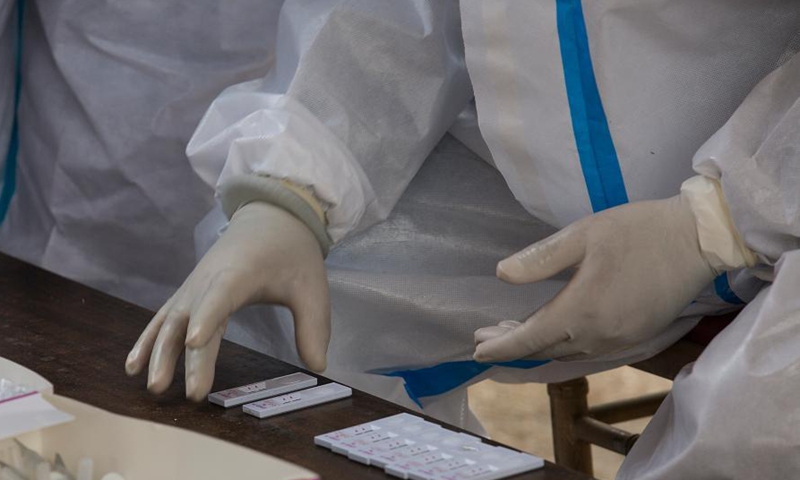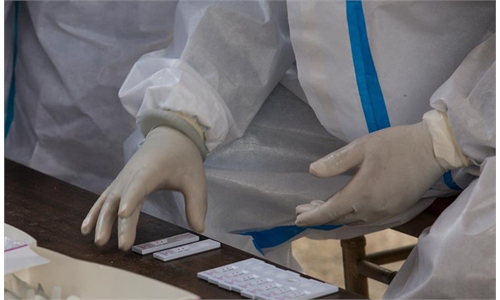Public-use antigen testing could help fight against COVID-19, does not mean an end to zero policy: expert

A health worker conducts COVID-19 Rapid Antigen Test.File photo:Xinhua
China's National Medical Products Administration on Saturday approved five COVID-19 antigen self-testing products for sale, which will be used as a supplement to the standard nucleic acid testing to help fight the spread of the virus. Experts said it was part of the nation's adjustment of epidemic prevention measures amid the recent spread of the Omicron variant, and could help shore up the nation's prevention capacity against possible larger scales of imported cases when the international community further reduces restrictions and when China gradually opens up in the future.
The five COVID-19 antigen testing kits are developed by five Chinese Biotech companies, including Vazyme Biotech in Nanjing and Jinwofu Bioengineering Tech in Beijing, according to China Central Television (CCTV).
Compared to nucleic acid testing, the antigen testing kits are much cheaper and convenient. The results of antigen testing also have a strong value despite the test's lower sensitivity than nucleic acid testing, said Zhang Wenhong, head of the Center for Infectious Diseases with the Shanghai-based Huashan Hospital of Fudan University, in an interview with Shanghai Media Group on Friday.
Citing examples in the Hong Kong Special Administrative Region which accepts antigen testing results during its ongoing fight against COVID-19, Zhang said the supplementary antigen testing could help the country to deal with possible larger scales of imported cases and control the spreading rate at a very low level when the international community further reduces restrictions and later when China gradually opens up in the future.
Allowing the self-use antigen testing is part of the preparation for massive testing, but it does not mean China will give up its zero-COVID policy, added Zhang.
Commenting on the difference between the current round of prevention against Omicron and previous rounds of prevention efforts, Zhang noted that there are breakthroughs being achieved in every step of the country's prevention work. Through the accumulation of the breakthroughs, a complete opening up will be eventually fulfilled, Zhang said.
Earlier on Friday, China's National Health Commission announced that the general public will be able to use rapid antigen tests. The commission said that in order to optimize virus detection, the country has decided to promote monitoring by using "antigen screening and nucleic acid diagnosis." It also released an antigen test trial protocol to standardize the process.
According to the trial protocol, the groups who can use antigen testing include those who need to go to hospital with symptoms such as respiratory tract infections or fever, as well as people who are under quarantine observation.
Jin Dongyan, a professor at the School of Biomedical Sciences at the University of Hong Kong, told the Global Times on Friday that the adjustment was made based on the features of the Omicron variant, which shows that China is adjusting its COVID-19 policy to be more scientific and targeted.
The transmission of Omicron seen in many Chinese cities recently requires early and rapid testing, and the antigen tests only take about 20 minutes to get results so they can identify positive cases at an early stage, Jin said.
The traditional nucleic acid testing takes longer, and sometimes the positive cases may no longer have the ability to infect others before their results come out. Quarantine for these cases will only result in a waste of resources, Jin said.
The Chinese mainland reported 1,100 locally transmitted COVID-19 infections on Friday, including local asymptomatic infections, the first time daily case numbers have exceeded 1,000 since the initial outbreak in Wuhan, Central China's Hubei Province.
China has seen spikes in locally transmitted COVID-19 infections in recent days, of which about 50 percent are asymptomatic cases, and the demand for nucleic acid testing has been growing fast. The Omicron variant is highly contagious and hard to detect, resulting in hidden transmission.
The Joint Prevention and Control Mechanism of the State Council held a video meeting on Thursday afternoon to call for related departments to firmly curb the epidemic and avoid further expansion, while sticking to the "dynamic zero-COVID" policy.
"Compared with nucleic acid testing, antigen tests have the advantages of convenience, rapidity and low cost, and residents can easily do the tests at home," Lu Hongzhou, head of the Third People's Hospital of Shenzhen, told the Global Times on Friday.
Lu noted that self-testing with antigen kits can help find infected people soon and reduce the exposure risk during nucleic acid testing to a certain extent.
Also, the majority of infectious cases can be detected by multiple antigen tests if they are conducted three or more times a week, according to Lu.
Jin said he and many health experts have called on the health authorities to adopt antigen tests for a long time, but he stressed that although antigen tests are much faster, they are still just a supplement to nucleic acid testing.
"Nucleic acid testing is more sensitive than antigen tests, which means that antigen tests need a higher concentration of COVID-19 virus than nucleic acid testing to detect positive results," Yang Zhanqiu, a professor with the pathogen biology department at Wuhan University, told the Global Times on Friday.
Nucleic acid tests will still be the basis for confirming COVID-19 infections, and antigen tests can be used as a complementary means of screening certain groups of the population, contributing to "early detection" capabilities, the commission explained in a notice released on Friday.
People can purchase antigen tests at pharmacies, online sales platforms and other channels, the trial protocol said.
Residents who test positive via antigen testing, regardless of whether they have respiratory tract or fever symptoms, should immediately report to their communities, and the communities should then contact the emergency center to transfer them to medical institutions for nucleic acid testing.
Asymptomatic residents who test negative via antigen testing can be kept under close observation, and those residents with symptoms but negative results should seek nucleic acid testing, the trial protocol said.
Jin said those who deliberately conceal their positive reports or use a fake report should be subject to legal accountability.


